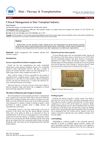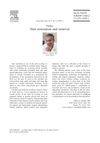 December 2017 in “Facial Plastic Surgery”
December 2017 in “Facial Plastic Surgery” The document concludes that successful treatment of upper and midface trauma should focus on restoring both appearance and function, with attention to facial structure, skin, and hair repair.
 19 citations,
August 2000 in “International Journal of Dermatology”
19 citations,
August 2000 in “International Journal of Dermatology” Minoxidil and finasteride can slow or halt hair loss, but may have side effects.
 1 citations,
January 2015 in “Hair therapy & transplantation”
1 citations,
January 2015 in “Hair therapy & transplantation” Many hair transplant patients are unhappy due to clinical mistakes and the need for better training of surgical assistants is crucial.
 14 citations,
September 2015 in “Expert Opinion on Therapeutic Targets”
14 citations,
September 2015 in “Expert Opinion on Therapeutic Targets” The conclusion is that while oral contraceptive pills are effective for PCOS-related high androgen levels, new treatments with fewer side effects are needed.
 July 2011 in “Springer eBooks”
July 2011 in “Springer eBooks” The document concluded that FDA-approved treatments like minoxidil and finasteride are effective for hair loss, while the effectiveness of natural remedies and other non-approved treatments is not well-supported by evidence.
83 citations,
August 2018 in “BJOG” Uterine transplants for transgender women are feasible but need more research.
 August 2009 in “Journal of Oral and Maxillofacial Surgery”
August 2009 in “Journal of Oral and Maxillofacial Surgery” Hair transplantation and micrografting are effective for facial enhancement with nearly 100% graft survival when done carefully.
 4 citations,
January 2008 in “Facial Plastic Surgery”
4 citations,
January 2008 in “Facial Plastic Surgery” Improve skin paddle appearance after head and neck reconstruction using tissue expansion, rearrangement, and flaps.
January 2021 in “International Research Journal of Ayurveda & Yoga” Ayurvedic treatments may effectively reduce hair fall and scalp issues.
 October 2010 in “Cambridge University Press eBooks”
October 2010 in “Cambridge University Press eBooks” Lifestyle changes like diet and exercise are key for treating overweight women with polycystic ovary syndrome.
 343 citations,
December 2008 in “Endocrine Reviews”
343 citations,
December 2008 in “Endocrine Reviews” Metformin helps with menstrual cycles and insulin levels in PCOS but is less effective for hair growth, diabetes prevention, and weight loss, and may improve fertility and reduce diabetes risk.
 December 2022 in “OBG Management”
December 2022 in “OBG Management” The conclusion is to diagnose PCOS with just hyperandrogenism and irregular periods, and treat with lifestyle changes and basic medications.
 September 2015 in “Actas Dermo-Sifiliográficas”
September 2015 in “Actas Dermo-Sifiliográficas” People with advanced chronic kidney disease often have skin problems, which can be treated with various medications and procedures to improve their quality of life.
 March 2024 in “Clinical, cosmetic and investigational dermatology”
March 2024 in “Clinical, cosmetic and investigational dermatology” Severe alopecia areata greatly impacts quality of life, mental health, and daily activities.
 May 2017 in “InTech eBooks”
May 2017 in “InTech eBooks” Early treatment of children's hair loss, which can be caused by various factors, is important due to its emotional impact.
 September 2023 in “Journal of the Dermatology Nurses’ Association”
September 2023 in “Journal of the Dermatology Nurses’ Association” Platelet-Rich Plasma (PRP) may be a safe and effective treatment for hair loss caused by Alopecia Areata.
 April 2018 in “Journal of Ayurveda and integrative medicine”
April 2018 in “Journal of Ayurveda and integrative medicine” Ayurvedic treatment improved hair growth in a person with hair loss.
 20 citations,
July 2000 in “PubMed”
20 citations,
July 2000 in “PubMed” The document outlines a method for diagnosing hair loss and suggests specific treatments based on the diagnosis.
 30 citations,
April 1997 in “European journal of endocrinology”
30 citations,
April 1997 in “European journal of endocrinology” The document concludes that managing hirsutism involves identifying the cause, using a scoring system for severity, combining cosmetic and medical treatments, encouraging weight loss, and providing psychological support, while noting the need for more research on drug treatments.
 January 2022 in “International journal of research in medical sciences and technology”
January 2022 in “International journal of research in medical sciences and technology” Ayurveda offers a safer and effective way to manage Seborrheic dermatitis without severe side effects.
24 citations,
April 2021 in “BMC women's health” High BMI worsens hair growth in women with PCOS.
April 2018 in “Pharmaceutical and biological evaluations” PCOS is a common hormonal disorder in women that can be managed with medication and lifestyle changes like exercise and weight control.
 June 2020 in “The journal of investigative dermatology/Journal of investigative dermatology”
June 2020 in “The journal of investigative dermatology/Journal of investigative dermatology” Pulsed red light boosts collagen and energy in cells faster than continuous red light.
 May 2004 in “Facial Plastic Surgery Clinics of North America”
May 2004 in “Facial Plastic Surgery Clinics of North America” Hair restoration techniques improved rapidly in 2004, leading to more natural results, with a shift to microscopic methods and diverse treatments including medical management, cloning, and surgical techniques. Laser hair removal was also mentioned.
 May 2004 in “Facial Plastic Surgery Clinics of North America”
May 2004 in “Facial Plastic Surgery Clinics of North America” Hair restoration techniques improved rapidly in 2004, leading to more natural results, with a shift to microscopic methods and diverse treatments including medical management, cloning, and surgical techniques. Laser hair removal was also mentioned.
 13 citations,
April 2017 in “Journal of Alternative and Complementary Medicine”
13 citations,
April 2017 in “Journal of Alternative and Complementary Medicine” Traditional and complementary medicine may help with skin conditions, but more high-quality research is needed.
24 citations,
January 2004 in “The scientific world journal/TheScientificWorldjournal” HAIR-AN syndrome is common in young women and can be effectively managed with a comprehensive treatment plan.
 2 citations,
January 2020 in “Elsevier eBooks”
2 citations,
January 2020 in “Elsevier eBooks” The document concludes that individualized Facial Feminization Surgery plans and comprehensive care are crucial for successful outcomes.
 July 2023 in “Journal of ayurveda and integrated medical sciences”
July 2023 in “Journal of ayurveda and integrated medical sciences” Ayurvedic treatment can help manage PCOS symptoms.
 March 2024 in “Cleveland Clinic journal of medicine”
March 2024 in “Cleveland Clinic journal of medicine” Alpha-blockers and 5-alpha reductase inhibitors are main treatments for BPH, with new support for phosphodiesterase-5 inhibitors and beta-3 agonists.
























